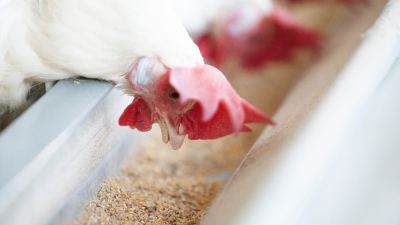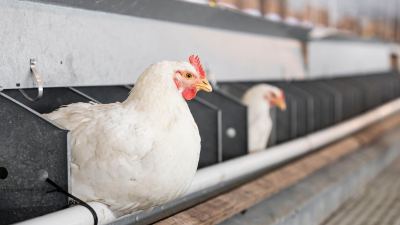Dr. Richard Murphy: Pet health starts in the bowl

Providing pets with the right nutrition at the right stage of life can have a profound influence on their health and immunity.
The following is an edited transcript of Nicole Erwin's interview with Dr. Richard Murphy. Click below to hear the full interview:
Nicole: Like their owners, companion animals are living longer, but are they functioning optimally in their later stages of life? I'm talking with Dr. Richard Murphy, research director at the Alltech European Bioscience Centre in Dunboyne, Ireland. Thanks for joining us.
Richard: Thank you very much for having me. It's a pleasure to be here again.
Nicole: Dr. Murphy, are we providing our fur babies the right nutrition as they age?
Richard: That's a great question. We could sit and talk for hours on this. We're engaged with a lot of different areas of research in Dunboyne. Primarily, it's on gut health. We’re interested in how nutrition influences the makeup of the bacteria in the gut. We're also very much engaged in trace element research, so we’re looking at how trace elements can impact not only the health of the animal, but also the quality of the food ingredients that we give to our pets.
I think that we need to be careful of what we put into their diet — that's probably the easiest way to look at it. We might think we're doing good, but we could be having a profoundly negative impact on the overall health of our pets.
Nicole: And how can we tell? Will our animals tell us by losing interest in their food? Will their bowels change? What are some signs that we can look for when our pets might need a change in diet?
Richard: Again, a great question. I think a lot of it, when you look at intestinal health, when you look at the microbiome, certainly bowel movements will give a big indication of whether there's something wrong. We know, for instance, a lot of the work that we do on our so-called mannan-enriched fraction — which we isolate from yeast cell wall — we can have a very profound influence on the diversity of the bacteria within the gut.
For me, the key to intestinal microbial health is to have as wide a diversity as possible in the types and range of different bacteria that are present within the gut. That's something that we know we can positively enhance. When you positively enhance the diversity of bacteria within the gut, you tend to have a much healthier gut. The animal tends to be able to resist those pathogen challenges that they would get from time to time. Certainly, when we look at the literature, there's a clear link between diversity, pathogen load and the antimicrobial resistance populations that are present.
Nicole: Does the information and packaging provide the answers that pet owners need when they go to the store? Should they be looking for something specific on the label when they're buying food for their pet?
Richard: I don't think the labeling will even begin to cover that. Manufacturers are limited in many ways to the types of claims that they could make on the packaging. It would be very difficult to explain in one sentence, for instance, how diet is going to influence the makeup of the bacteria within the gut, or how nutrients in the food are going to influence the overall makeup of the nutrients in the gut. So, I think the labeling lets us down, but that's not the manufacturer's fault. There's only so much they can do.
Nicole: From a market perspective, are millennials driving the pet food industry like they are with everything else? I was skimming through Facebook the other day, and I saw a GIF that read, "I work so that I can provide the backyard that my dog deserves." I love that because so many of my friends have that same thought process. If we're making our living decisions around our pets’ happiness, how might that translate into market demands for food and nutrition choices for our fur friends?
Richard: Certainly, from what I've seen and from what I read in the popular press and the news, there is a clear drive now whereby people really want to give their pets the absolute best. So, they're not willing to accept second-rate for their pets. They really want to move more toward premium, and they are looking at providing optimum nutrition.
I think people are more in tune now with how diet and health are linked. With the internet being what it is these days, you can very quickly find a lot of information — some of it “fake,” perhaps — but certainly, you can find a lot of information that will tell you what is good or what is bad. I guess the old adage "pay peanuts, get monkeys" comes to mind as well. If you want a quality product, you really need to look at spending a little extra.
Nicole: I've seen many dogs with tumors — cancerous and non-cancerous — food allergies, you name it. These aging ailments, as with humans, get costly with vet visits. How are you gaining an understanding of how nutrition and immune defenses interact?
Richard: We’ve gotten a lot of insights over the years from the work on monogastrics like pig and poultry, for instance. So, we know that by providing the optimum nutrients and providing the right nutrition at the right time at the right stage of life, you can positively influence the health and performance of “meat animals,” if you want to put it that way. Certainly, the trend toward the development of pet food over the last 10 or 15 years has been more and more toward premium. People have tapped into work that would have been generated from meat production animals, and basically been able to translate that into more optimum nutrition for pets.
Nicole: If the secret to immunity starts in the bowl, which is what we're hearing more and more, how can we choose what is appropriate for our pets when each animal has its own unique microbiome?
Richard: Again, it's back to drawing insights from what we see and work with on the monogastric side. You can get a lot of information from peer-reviewed publications. Scientists will tell you that the overall microbial population in the gut is so important that they would ascribe it being alike to an additional organ. They would actually say that the microbiome is actually like an extension of the body. Such is the importance of it in regard to overall health.
It’s known through many different studies that the gut microflora population, with the way in which it works in terms of breaking down nutrients and producing short-chain fatty acids, can have a profound influence on the development of, not just immune function, but overall intestinal health.
We even see work coming out from a group at University College Cork in Ireland that basically indicates that the microbiome connection can control mood. So, if you look at the gut microflora and look at how we influence it, I think it's very profound in the way we can influence not just the health and performance of our pets, but also perhaps even, in the future, looking at enhancing their mood.
Nicole: Dr. Richard Murphy is the research director at the Alltech European Bioscience Centre in Dunboyne, Ireland. Thank you so much.
Richard: Thank you very much. It's a pleasure.
Dr. Richard Murphy spoke at ONE: The Alltech Ideas Conference. Click below to view presentations from ONE18:
















